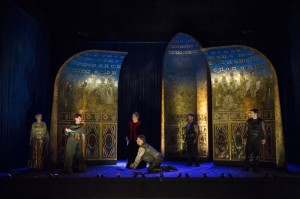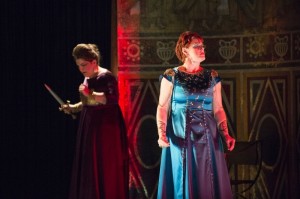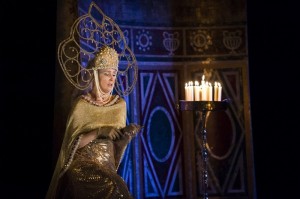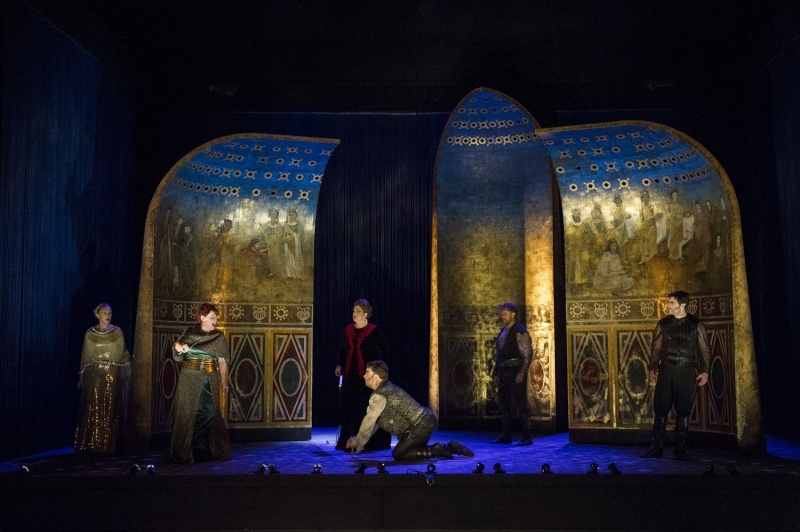
It’s no secret that I adore Handel’s music; he’s undoubtedly my favourite opera composer and English Touring Opera’s Agrippina was one of the best things I saw last year. So I had pretty high expectations of their Ottone at the Gala Theatre this week, and I wasn’t disappointed. I went home on a real high, super-charged with energy and excitement that began with the first crisp notes of the overture and the sight of designer takis’s beautiful Byzantine cupola that formed the simple set.
Gillian Webster sang the title role in last year’s Agrippina and she was back this year as another power-crazed mother, Gisimondo, who pushes her son Adelberto into usurping Ottone’s throne and stealing his bride Teofane. The two characters seem similar to begin with, especially in Gisimondo’s early arias where her singing was on fire with pride and ambition, but as her plans unravel and she has to decide whether she loves her son despite his failure, her character becomes more complex. In James Conway’s abridged production, the first half ended magically with her moving aria Vieni, o figlio, e mi consola, with the da capo a tragic whisper.
The two rivals, Ottone and Adelberto are both sung by countertenors, Clint van der Linde and Andrew Radley respectively. Clint van der Linde swaggered heroically through most of the opera, bouncing energetically through his arias, confident that he was going to win all his battles, until suddenly, when Ottone thinks he has lost Teofane for good, he breaks down under Gisimondo’s rage and becomes suddenly vulnerable, with a passionately lyrical aria. Adelberto by contrast was weak and cowardly, constantly thwarted by all the other characters – Andrew Radley’s acting of this unpleasant character was excellent.

Handel’s da capo arias are sometimes criticised for holding up the action, but the cast and orchestra of Ottone proved repeatedly how this format can deepen the drama, giving an opportunity for audience and musicians to take time to explore a character’s motives and psychology. Matilda, Ottone’s sister and in love with Adelberto, is probably the most troubled character of the opera, and really needs more than a few da capos to sort herself out: mezzo-soprano Rosie Aldridge gave a passionate portrayal of Matilda’s hopeless infatuation, and how it clouds her judgement and twists her loyalties. She has the ideal Handel mezzo voice – rich and with just a little vibrato and the agility to power through the raging runs. Diresti poi così in which she debates whether she has the power to overcome her infatuation hung in the air with beautifully sustained long notes and dramatic pauses that became even longer in the repeat.
Surrounded by high voices, the bass of Grant Doyle singing the role of Emireno, the pirate with a secret, stood out for its depth and power. His first aria Del minacciar del vento was magnificent and exciting, supported by high-octane accompaniment from the Old Street Band, and one of the highlights of this excellent production, whilst at the end when he comforts Teofane, he was so soothing that it seemed as if he was easing the cares of every person in the theatre.

The real star of the show though was undoubtedly Louise Kemeny as Teofane, the young princess of Byzantium who has been sent to marry Ottone. She was arrayed gorgeously in glittering gold, dripping with pearls, looking as if she had just stepped out of a Byzantine mosaic, but under all the glitter, every gesture she made showed that she was a very, very frightened young girl, trapped under the stiff formality expected of an imperial princess. Her first aria, the one that became the opera’s greatest hit, Falsa imagine, ached with disappointment, enhanced by the delicate ornaments in the da capo. The grinding harmonies from the expressive strings further enhanced her sorrow in Affanni del pensier whilst later, in Act 2, they underlined her misery with great sobs of despair.
At the end, when Teofane’s troubles are over, and she is finally united with Ottone, she shows herself as a Real Princess in her dignified clemency towards those who wronged her, and both she and Ottone expressed their effervescent joy not in their actions but in the ecstatic ornaments in their final duet A’ teneri affetti, especially as Louise Kemeny soared effortlessly up to her high notes, before the entire cast closed with the final chorus. This last chorus hinted that perhaps their peace and happiness might not last for long, however much the eminently likeable Ottone and Teofane of this production might deserve it.
(For background and an introduction to Ottone – see link below “Handel’s forgotten hit”)








